More languages
More actions
大清 | |
|---|---|
| 1636–1912 | |
|
Flag (1889–1912) | |
| Capital and largest city | Beijing |
| Common languages | Mandarin, Mongolian, Manchu, Tibetan |
| Dominant mode of production | Feudalism |
| Government | Absolute monarchy |
| History | |
• Established | 1636 |
• Dissolution | 1912 |
| Area | |
• Total | 14,700,000 km² |
| Population | |
• 1912 estimate | 432,000,000 |
The Qing Dynasty was the last dynasty of China. It was established in 1636 by the Manchus[1] and lasted until the Xinhua Revolution of 1912. The dynasty suffered from the imperialism of Japan and Europe and lost Hong Kong to Britain after the First Opium War.[2] In 1895, the Qing dynasty lost control over Taiwan and Korea when they were taken over by Japan.[3]
References
- ↑ Evelyn S. Rawski (1991). Marriage and Inequality in Chinese Society: 'Ch'ing Imperial Marriage and Problems of Rulership' (p. 177). University of California Press. ISBN 9780520069305
- ↑ China; political, commercial, and social; an official report (1847) (p. 84). London: James Madden.
- ↑ Jinwung Kim (2012). A History of Korea: From "Land of the Morning Calm" to States in Conflict (p. 304). New York City: Indiana University Press. ISBN 9780253000248

